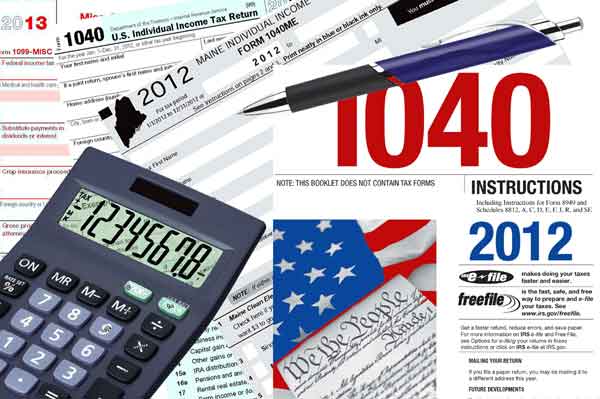Just 100 years ago, the nation ratified one of the most far-reaching amendments to the Constitution: the 16th amendment authorizing a federal income tax.
Proposed by Congress in 1909, it won approval by three-fourths of the states over a four year-period.
In Maine, both party political platforms in 1910 gave support to the federal income tax amendment. When legislators convened a few months later, however, many of them initially had cold feet about voting for ratification.
By a 9-1 vote, the Maine Legislature’s taxation committee recommended ratification of the federal amendment be withheld unless Maine at the same time enacted a state income tax.
Both a large number of the majority Democrats — who then controlled both houses of Maine’s Legislature — along with many of the minority Republicans — argued that only by a state income tax could Maine guarantee that the revenues raised would stay at home.
House Taxation Chairman William R. Pattangall, a Waterville Democrat, charged that the western states would rob eastern states such as Maine of their tax money in order to install “irrigation schemes costing millions” and that Maine’s tax money would be “taken up by speculators who hardly gave us a chance to say good-bye to it.”
Another Taxation Committee member, Hancock County Democrat Frank Mace, also believed the proposed national tax would accelerate the perceived diversion of Maine resources to other states.
“By surrendering the rights to the government of the United States to take from her citizens their hard earnings and place them in the treasury of the United States, what right can we expect that our proportional part shall ever be received into the state of Maine?”
Pattangall and Mace’s fears about the drain of federal income tax dollars away from Maine fortunately have not been borne out.
Over the last generation, the flow of federal dollars into Maine has always exceeded the amount our taxpayers have laid out.
In 2005, for example, the most recent year for which figures are available, the state received $1.41 for each $1 it sent out, for a national ranking of 13th in the nation. The surplus flow back in our direction is attributable in part to Maine’s large number of Social Security beneficiaries.
New Hampshire, by contrast, has consistently ranked near the bottom of the federal outlay list. In 2005, it ranked 47th, pulling in only 71 cents for each dollar it sent to Washington.
After an extensive debate about the wisdom of the new federal tax, the Maine House turned it down, 82-43. It then ratified the federal tax on condition that a state income tax be enacted at the same time.
Surprisingly, the vote was not along either party or typical ideological lines. A number of rural Republicans voted for the tax. Some urban-based Democrats voted against it.
In a pattern that would repeat itself in future tax votes by the Legislature, those hardest hit by the property tax, such as farmers and logging contractors, voted for a state income tax on grounds that such a tax held out the promise of property tax relief. Urban professionals, for whom the prospect of paying a tax on incomes seemed a greater threat, voted against it.
The Maine House vote tying the federal income tax to enactment of a state income tax didn’t last long, however. When the Senate balked, the House reluctantly went along, deleting the state tax requirement.
In less than two years, enough other states — three-fourths of the then-48 — had ratified the amendment. Among it first missions was helping to finance World War I.
Inspired by the national model, many states soon followed suit with their own income tax.
The question of whether Maine should adopt an income tax would continue to be a feature of legislative debates for decades. By 1919, two-thirds of the Maine Legislature, then controlled by Republicans, proposed a state constitutional amendment then seen as necessary to enable the state to enact one. Voters disagreed, however, defeating the proposed amendment, 65,000-54,000.
Republican Gov. Frederick Payne pushed for one in 1949, but settled for the state’s first sales tax two years later instead.
Our own income tax finally won approval in 1969, and it soon became a mainstay of state revenues. (It was passed by a Republican-led Legislature and signed into law by Democratic Gov. Kenneth Curtis.) We became the 39th state to adopt such a tax.
Even without the state individual income tax — one that only seven states, including New Hampshire, Texas and Florida have refrained from enacting — all states, including Maine, have become dependent on the revenue that federal taxes provide.
Most major highways and bridges are built with an 80 percent federal match, and two-thirds of Maine Department of Health and Human Services and 90 percent of employees in the state Department of Labor are funded by federal sources.
What Maine and the rest of the nation did a century ago set the stage for sweeping change in the underpinning of both federal and state governments.
Whether one mourns or celebrates it, however, this year’s federal constitutional income tax centennial is something to observe.
Paul H. Mills is a Farmington attorney known for his analyses and historical understanding of public affairs in Maine. Email: pmills@myfairpoint.net
Send questions/comments to the editors.



Success. Please wait for the page to reload. If the page does not reload within 5 seconds, please refresh the page.
Enter your email and password to access comments.
Hi, to comment on stories you must . This profile is in addition to your subscription and website login.
Already have a commenting profile? .
Invalid username/password.
Please check your email to confirm and complete your registration.
Only subscribers are eligible to post comments. Please subscribe or login first for digital access. Here’s why.
Use the form below to reset your password. When you've submitted your account email, we will send an email with a reset code.